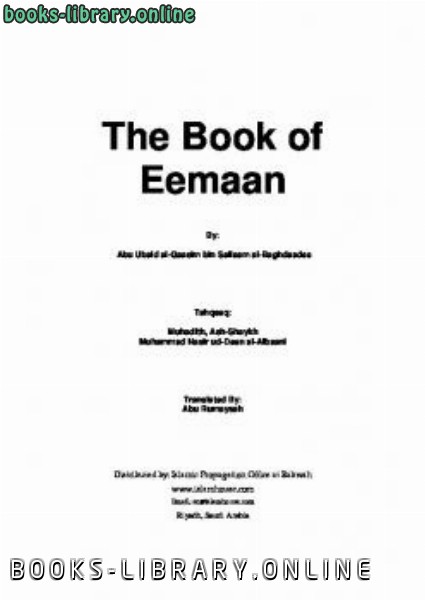📘 قراءة كتاب The Book of Eemaan أونلاين


Table of Contents
_________________________
Biography of the Author ...........................
...................................................
....................... 3
Chapter 1: the Characteristics of faith concerning
it’s completion and it’s levels ............. 5
ndeed have you asked me about faith, and the diffe
rence of the nation concerning it’s
completion and it’s increasing and decreasing, and
you mentioned that you would like to
know the position of Ahlus Sunnah with regards to t
his, and the proof of those who differ
from them on this. So indeed, may Allaah have mercy
upon you, know that this subject
was discussed by the Salaf at the beginning of this
ummah and by those that followed
them (taabi`een) and those who followed them till t
his day of ours. I have written to you a
short explanation of what I know concerning this.
Know, may Allaah have mercy upon you, that the Peop
le of Knowledge and Concern for
the religion have split into two groups over this i
ssue.
One of them says: Faith is sincerity in the heart t
o Allaah, and testimony of the tongue,
and action of the limbs.
The other says: Rather faith is in the heart and up
on the tongue, and as for actions then
they are from
taqwaa
(God-consciousness) and
birr
(piety) and are not included in faith.
And we looked into the difference of opinion of the
se two groups, and we found that the
Book and the Sunnah affirmed the truth of the group
that made Faith intention, saying
and action together, and negated the opinion of the
other group.
And the basis of this, which is our proof, is follo
wing what the Qur`aan has spoken of, for
indeed Allaah has said in the unequivocal verse of
His Book,
"So if you differ amongst yourselves on anything t
hen refer it back to Allaah and
the Messenger if you believe in Allaah and the Last
Day, that is better and more
suitable for final determination." (4:59)
We referred the matter to that which Allaah sent Hi
s Messenger (SAW) with and
revealed in His Book. So we found that He made the
commencement of faith to be the
testimony that none has the right to be worshipped
except for Allaah and that Muhammad
is His Messenger (SAW). And the Prophet (SAW) remai
ned in Mecca after his
Prophethood for ten years or ten odd years calling
to this testification only, and at that
time nothing else was prescribed to be part of fait
h, so the one who responded to this call
was a believer and it was not necessary to call him
anything else but a believer, and
zakaah
or fasting or the other regulations of the religio
n were not obligatory upon him.
The scholars have explained this by saying that thi
s leniency at that time was a Mercy
and Kindness from Allaah to His Servants, because t
hey had just come out of the
Jaahiliyyah
and it’s harshness and had He charged them with al
l of the obligations then
their hearts would have become averse to the revela
tion and their bodies would have felt
burdened. So He made the faith that was obligatory
upon them at that time affirmation
with the tongues only, and this is what made them t
o be believers during the whole of the
Meccan period and ten odd months in Madeenah after
the
Hijrah
.
hen, when the people had returned to Islaam and th
eir desire for it became good and
proper, Allaah increased for them in their faith th
at they change the prayer direction to
the Ka’bah after they had been praying to Bail al-M
aqdis, saying,
"Verily We have seen the turning of your face towar
ds the heaven. Surely, We shall
give you a Qiblah that you are pleased with, so tur
n your face in the direction of the
Holy Mosque. And wheresoever you people are, turn y
our faces (in prayer) in that
direction." [2:144].
Then He addressed them, when they were in Madeenah,
by the appellation of faith that
had previously been given them whenever He ordered
them with something or forbade
them from something. So He said, while commanding,
"O you who believe! Bow and prostrate" [22:77],
"O you who believe! When you intend to offer prayer
, wash your faces, and your
arms upto the elbows."
[5:6].
He said, while prohibiting
,
"O you who believe! Do not devour usury doubled and
multiplied."
[3:130].
"O you who believe! Kill not game while you are in
a state of ihraam"
[5:95].
So in every address that was directed to them after
the
hijrah
containing a command or
prohibition, He named them with this name (believer
s) due to their affirming the
shahaadah
alone - since at that time nothing else had been ma
de obligatory for them. But
afterwards, when the religious laws were revealed,
these were made obligatory upon
them in exactly the same way as the first obligatio
n (of testifying to the
shahaadah
) was,
this because they were all from Allaah (sent) by Hi
s Command and Obligation. So if they
had refused to turn to the direction of the Ka`bah
in their prayer and stuck to that faith
[they had in the beginning of Islaam] whose appella
tion they were ascribed to, and they
had stuck to the
qiblah
that they used to pray towards, then this would no
t have helped
them at all, and they would have violated their aff
irmation of the shahaadah. This because
the first obedience was not more deserving of the a
ppellation of ‘faith’ then the second,
so therefore when they responded to Allaah and His
Messenger and accepted the
(obligation of) prayer just as they had responded b
y affirming (the
shahaadah
) then all of
this would now be included in the appellation ‘fait
h’ - due to the prayer being added to
the affirmation
written by Imam Abu Ubaid alQaasim bin Sallaam alBaghdaadee, and the Tahqeeq of Imam Muhammad Nasir udDeen alAlbaani.
حجم الكتاب عند التحميل : 123.9 كيلوبايت .
نوع الكتاب : pdf.
عداد القراءة:
اذا اعجبك الكتاب فضلاً اضغط على أعجبني و يمكنك تحميله من هنا:

شكرًا لمساهمتكم
شكراً لمساهمتكم معنا في الإرتقاء بمستوى المكتبة ، يمكنكم االتبليغ عن اخطاء او سوء اختيار للكتب وتصنيفها ومحتواها ، أو كتاب يُمنع نشره ، او محمي بحقوق طبع ونشر ، فضلاً قم بالتبليغ عن الكتاب المُخالف:
 قبل تحميل الكتاب ..
قبل تحميل الكتاب ..
يجب ان يتوفر لديكم برنامج تشغيل وقراءة ملفات pdf
يمكن تحميلة من هنا 'http://get.adobe.com/reader/'


 منصّة المكتبة
منصّة المكتبة 